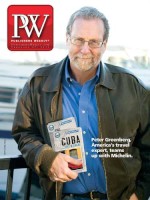John Donatich, who as director of the Yale University Press has published bestselling authors Christopher Hitchens, Steven Pinker, and Alan Dershowitz, examines how the Catholic Church, faith, and classical music relate to the modern world in his debut novel, The Variations.
Does the way that your protagonist, Father Dominic, speaks out against controversial positions of the modern Catholic Church help pave the way for him to break his vows?
It’s a tricky situation for both the clergy and the church. Some priests are objecting to certain orthodox traditions that the church insists are the very standards that distinguish Catholics. But seminary enrollments are down 70% in the past few decades. I find that the men who do serve as priests are extraordinary in so many ways, following their calling despite the odds. They are, in a way, their own counterculture.
On his blog, Father Dominic demonstrates his mounting inability to fulfill his spiritual devotions. Why is he unable to rescue himself from breaking his holy vows?
Doubt is essential to faith. Father Dominic’s “failed prayers” are meditations on his own troubled relationship to faith, on his inability to pray as well as his refusal to give up prayer. I also wanted a narrative device in which Dominic would be free to be introspective. I wanted to write a character whose full-time job it was to contemplate and examine the good life—without the inhibition of embarrassment or the alibi of irony. Imagine what that would be like!
Bach’s Goldberg Variations plays a major role in your novel.
I wanted to explore how a piece of music that had a modest beginning (commissioned by a wealthy insomniac count to help put him to sleep) ended up being regarding as the musical paradigm of intellectual rigor and seriousness. James, an African-American pianist working his way through Bach’s masterpiece at an Ivy League conservatory, explores, with Father Dominic, the ties between virtue and virtuosity; how faith, like music, is something that can never be known fully or completely—just practiced. And I find that the Goldberg Variations is still a touchstone. Just in the last two weeks I encountered it in the movie Shame and in the play Red. The Goldberg Variations seems to communicate instantaneous seriousness and intimate solitude.
Is your novel at all autobiographical?
I grew up in a devout Roman Catholic neighborhood in New Jersey, served as an altar boy, and was told that becoming a priest was basically the highest and noblest ambition any young man could have. Even though I wanted to live up to that standard, I was never that serious about it and in any case puberty, Nietzsche, and girls brought me down to earth.



 Volume 259
Issue 09
02/27/2012
Volume 259
Issue 09
02/27/2012





